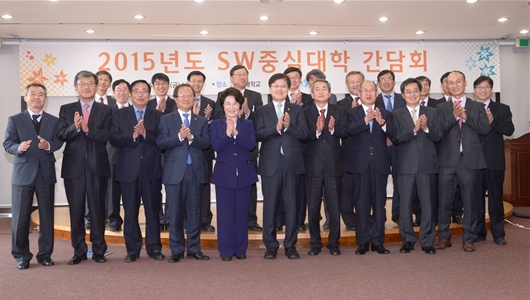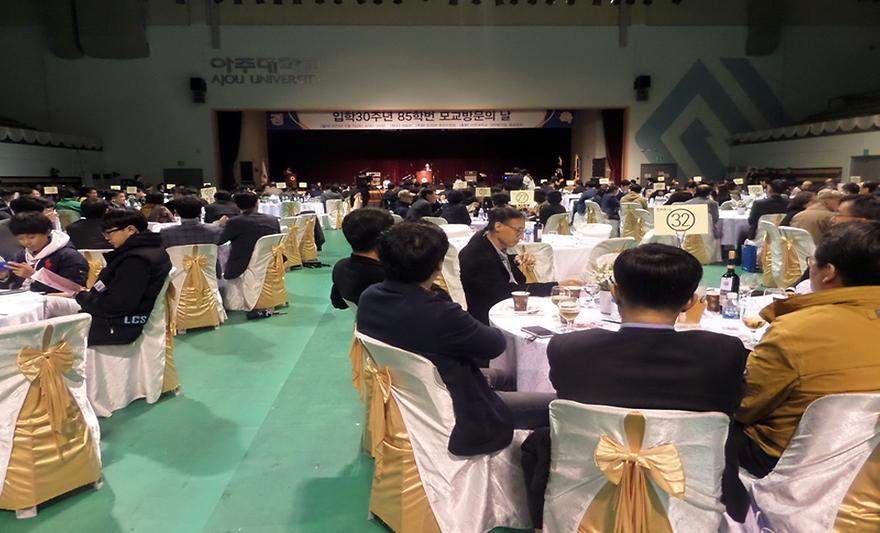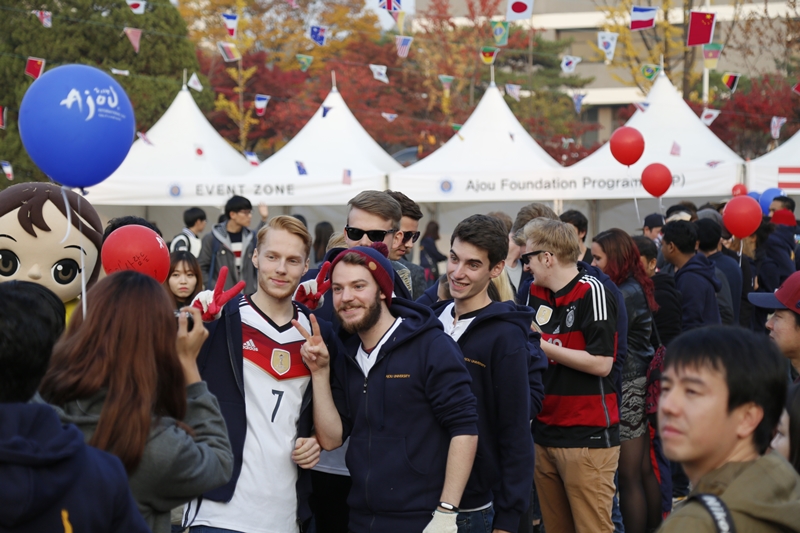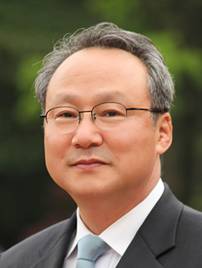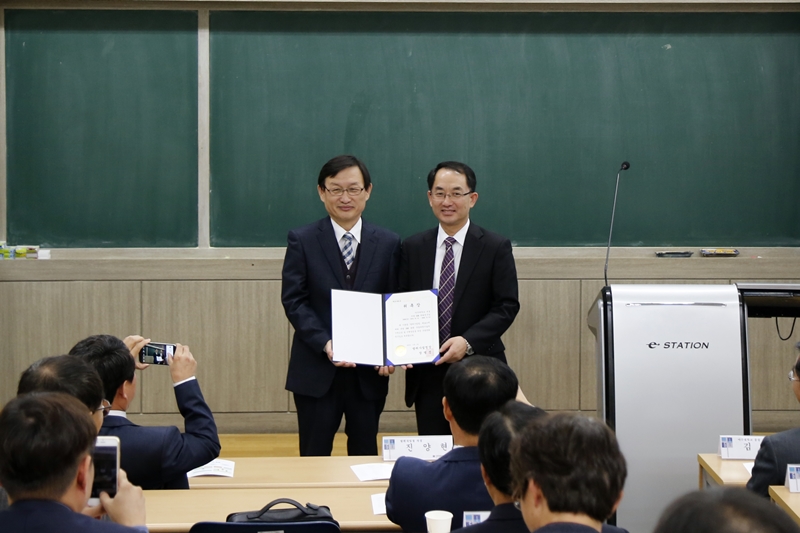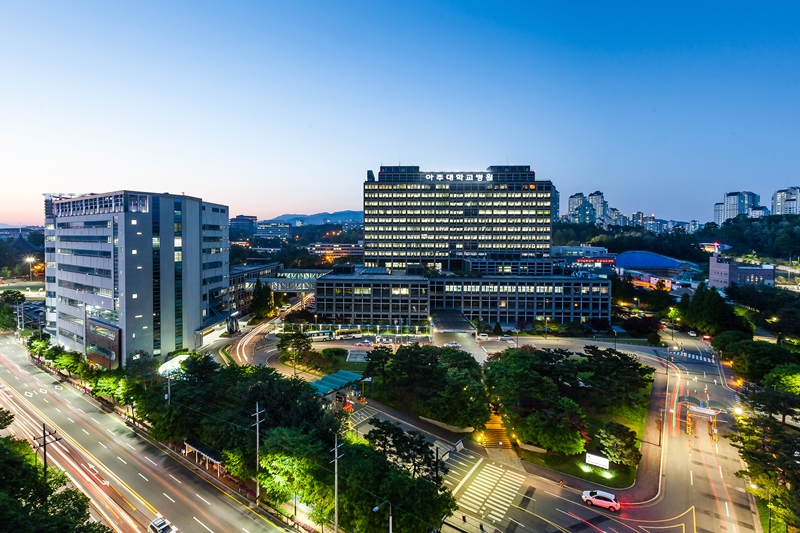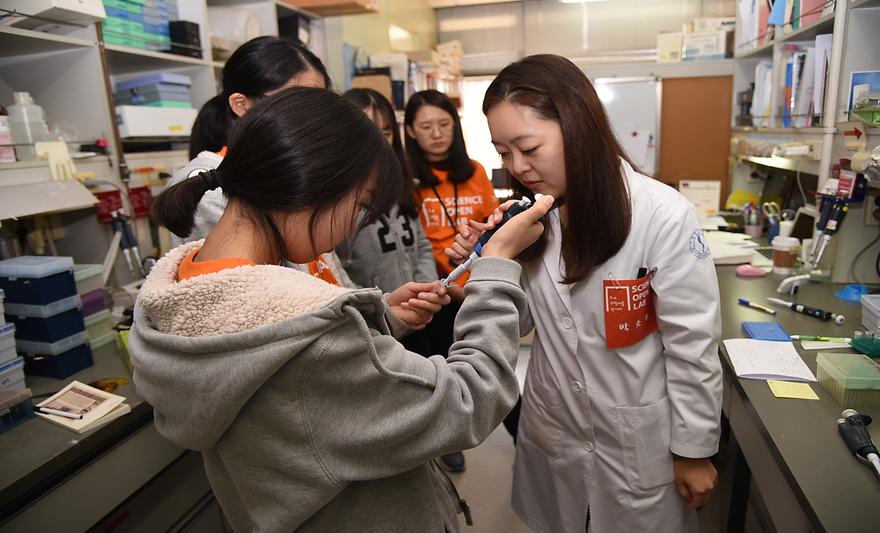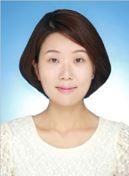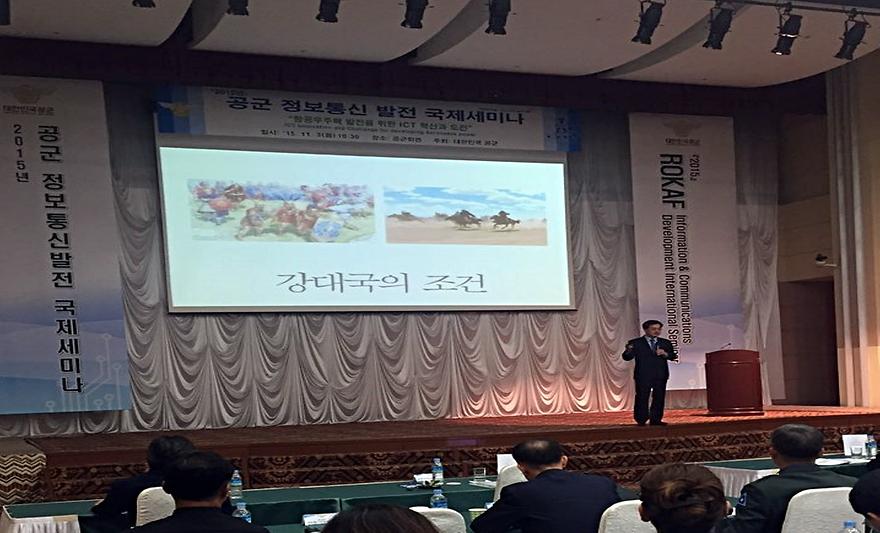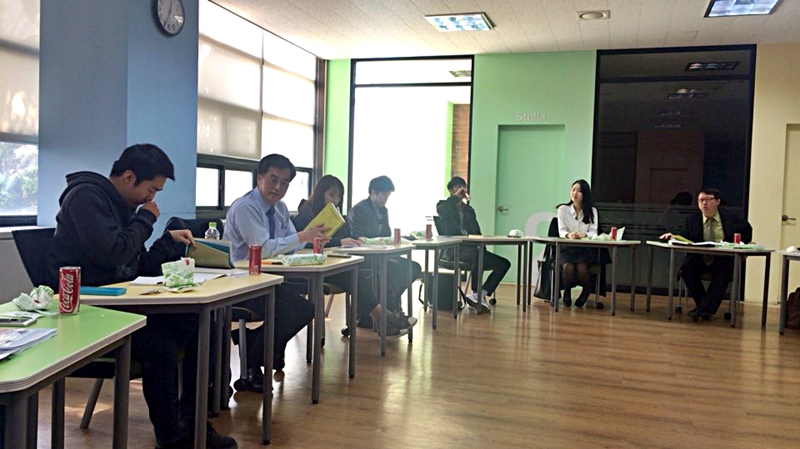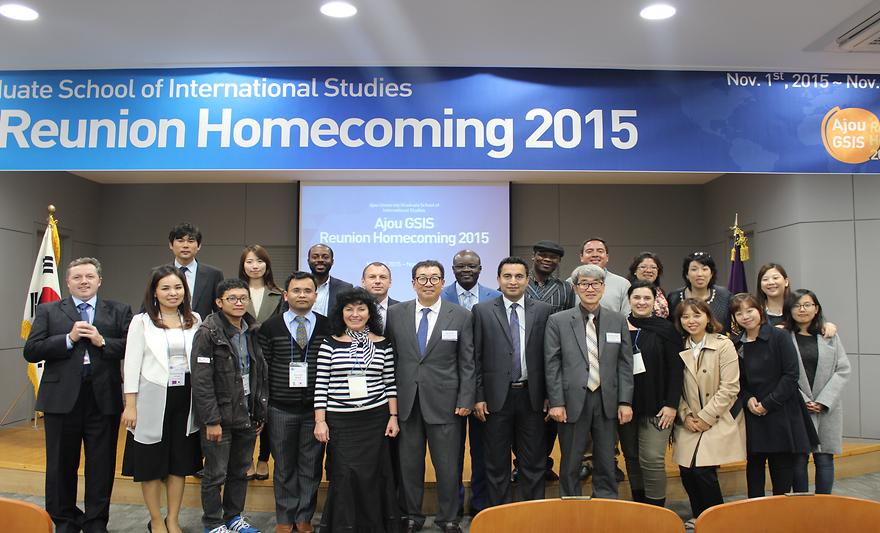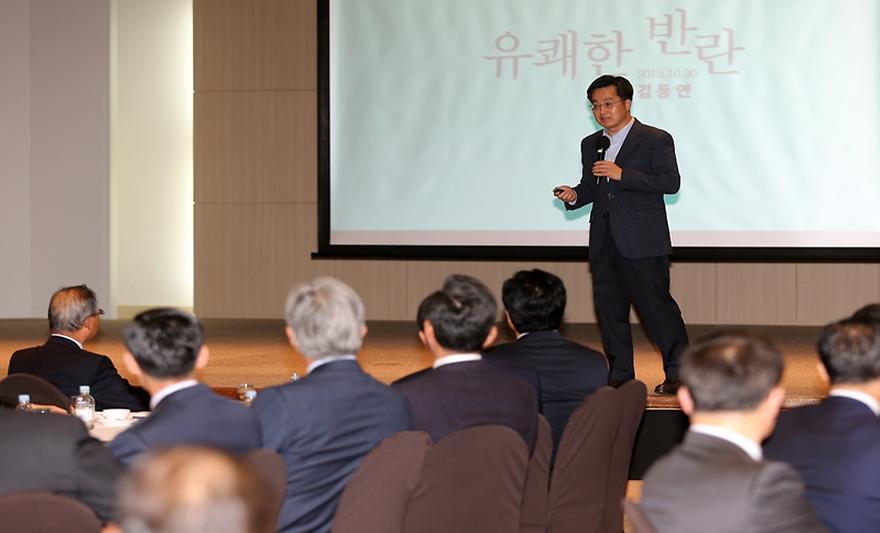-
The Software Specialized Universities Council is launched2015-11-09At noon on November 6th, the first meeting of the Software Specialized Universities Council was held at Sogang University. President Dong Yeon Kim, Professor Ki Yeol Ryu (Department of Information and Communication Engineering) in charge of the Software Specialized University Project, and relevant officials attended the meeting from Ajou.Members of the Council are eight universities that were selected last month as Software Specialized Universities by the Ministry of Science, ICT, and Future Planning, including Ajou, Gachon University, Kyungpook National University, Korea University, Sogang University, Sungkyunkwan University, Sejong University, and Chungnam National University. The Council is the first organization among Korean universities that seeks to foster talents for the development of high-tech convergence industries, and it will work to support innovation of software education in the country.Presidents of the eight member universities, including President Kim, Minister of Science, ICT, and Future Planning Yang Hee Choi, and related officials attended the Council meeting on that day. It began with greetings from Minister Choi, followed by presentations on the operational directions by professors responsible for the project at the member universities, and discussions among the participants. Professor Ryu said, "In March 2016, Ajou plans to combine the Department of Information and Computer Engineering and the Department of Software Convergence Technology under the College of Information Technology to launch the Department of Software, for which the maximum number of students will be 106, and the University will raise the number of professors to 36 from the current 28. Minister Choi said, "I ask that member universities use this project to create a model that can attract foreign students to Korean universities, and help graduates to find various career opportunities ranging from research institutions to starting their own businesses."Ajou's President Kim said, "I consider this project a timely one and will not spare any effort to accomplish the established plan," emphasizing the three following issues during the discussions. First, the project should help to foster creative talents by executing it with a creative mindset and methods. Second, there will be synergistic effects if universities expand relevant education to those who do not major in software, and high school students, and encourage convergence with other areas, since convergence is a key to the software industry. Third, the universities taking part in the project should pursue the accomplishment of common goals by working together and competing with domestic companies and foreign universities, etc."Ajou is set to receive an annual average of 2 billion won over up to six years, now that it has been selected by the Ministry of Science, ICT, and Future Planning as a Software Specialized University in early October.
-
80
- 작성자OIA
- 작성일2015-11-16
- 27739
- 동영상동영상
-
Ajou's Homecoming Day is held on the 7th for the admitted class of 19852015-11-09A homecoming day event for Ajou's admitted class of 1985 was held on the afternoon of November 7th in the University Gymnasium.The event, which began at 4 p.m., was attended by about 180 graduates, and about 120 people from the University, including their professors, President Dong Yeon Kim, and professors with administrative positions. The event kicked off with a campus tour, followed by welcome remarks and an introduction of Ajou's development directions by President Kim, a congratulatory message by President Beom Jae Lee of the General Alumni Association, a progress report, the delivery of the University development fund, and a congratulatory performance. After the official event, the graduates had separate meetings by department and discussed the significance of the event.President Kim introduced the University's development strategy - Ajou's Great Turning -, saying "The University professors, staff members, and alumni put their heads together and worked hard to create the strategy. Hence, I ask that the alumni join hands with the professors, staff members, and students to accomplish the goals in the strategy."President Lee of the General Alumni Association said, "I am glad to see the admitted class of 1985 work closely together to prepare this event," and Chairman Yeong Seop Son (Department of Computing, admitted class of 1985) of the Homecoming Day Organizing Committee said, "I am thankful that many people have participated despite the bad weather. I hope that today's event will be an opportunity to solidify our affection for and commitment to the University for another 30 years."During the event, the admitted class of 1985 delivered 10 million won to support the ‘After You Program’ and promised to donate 100 million won to the University development fund.< Ajou's President Dong Yeon Kim explains the University's development strategy.>< President Beom Jae Lee of the General Alumni Association gives a congratulatory speech. >
-
78
- 작성자OIA
- 작성일2015-11-16
- 27339
- 동영상동영상
-
The 20th Ajou International Day is held2015-11-05Ajou International Day, which marks its 20th anniversary this year, was held with the most foreign students – about 630 – in the history of the event.The event began at 11:30 a.m. and concluded at 7 p.m. on November 5th. It kicked off with a performance of a Korean traditional percussion band, followed by the World Food Fest, a tug of war contest, and a talent show, etc. There were other activities for the participants, including “Experience Royal Costumes” and “Korea's Traditional Games”.“K-Pop Dance Performance”, which was prepared by the members of Ajou's hip-hop dance club 'Beat' and AGA (a group of volunteers helping foreign students), was interesting in that the performers and participants danced together. Though Korea's traditional tug of war was new to foreign students, they participated with interest and enjoyed the contest.During the talent show that took place in the afternoon, traditional dances by foreign students from different countries were very popular among the participants.
-
76
- 작성자OIA
- 작성일2015-11-12
- 27504
- 동영상동영상
-
Ajou's Professor Hae Seong Je (Department of Architecture) wins 'Architect of the Year Award'2015-11-05Ajou University's Professor Hae Seong Je (Department of Architecture, pictured above) won the 'Architect of the Year Award' at the Korean Architecture Awards. The award presentation ceremony was held at 2 p.m. on November 5th in the auditorium of Registered Architects Building.Professor Je received the award for contributing to various policies and systems research regarding architecture and urban planning while serving as the Director of the Architecture & Urban Research Institute (AURI) under the Prime Minister's Office from September 2012 to October 2015. AURI, which is the first national research institute in the fields of architecture and urban planning, designs the big picture of architecture at the national level in relation to the Framework Act on Building, Building Act, Landscape Act, Act on Providing Assistance for Constructing Green Buildings, Act on Promoting the Construction Services Industry, and Act on Promoting Architectural Assets including Hanok. AURI also conducts studies regarding government policies.During his service at AURI, Professor Je contributed to legislating the Act on Providing Assistance for Constructing Green Buildings, Act on Promoting the Construction Services Industry, and Act on Promoting Architectural Assets including Hanok, and Special Act on Promoting and Assisting Urban Restoration. He also provided steady support for various policy initiatives that were carried out by the government, including the Center for Hanok (traditional Korean houses), the Center for Supporting Public Architecture, the Organization for Supporting Urban Restoration, and the Green Architecture Center.In an interview after winning the award, Professor Je said, "While working at AURI, I prioritized enhanced contributions to government policies so that the Institute could fulfill its functions as a national research institute," adding, "I tried to preemptively respond to social issues and provide full support to government policies via research activities that took advantage of the Institute’s status as a government-invested institute."Professor Je majored in architecture at Seoul National University and obtained his Master's degree from the Massachusetts Institute of Technology and his PhD from the University of Pennsylvania in the U.S. Since 1987, he has spent 25 years as a professor at Ajou. During the period, he served as Dean of the College of Engineering at the University, President of the Urban Design Institute of Korea (UDIK), and Head Planner for the National Agency for Administrative City Construction (NAACC), etc.
-
74
- 작성자OIA
- 작성일2015-11-12
- 27559
- 동영상동영상
-
Ajou's RAM Research Lab for National Defense is launched2015-11-05In August, Ajou University's team led by Professor Joong Soon Jang (Department of Industrial Engineering) was selected the RAM Research Lab for National Defense in 'the 2015 National Defense Specialized Research Lab Selection' by the Agency for Defense Development under the Ministry of Defense. RAM stands for Reliability, Availability, and Maintainability, and it contributes to improving combat execution abilities by designing weapon systems in a way that prevents breakdowns and by conducting preventive maintenance.The opening ceremony of the RAM Research Lab for National Defense began with the presentation of the certificate appointing Professor Joong Soon Jang as Director of the National Defense Specialized RAM Research Lab, followed by a progress report, an introduction of the Lab, congratulatory remarks by guests invited from inside and outside of the University, and the sign board hanging event. Professor Jang, in his introduction of the Lab, said, "Our goal is to establish the concept and technologies of RAM that are optimized for the unique weapons system and the operational environment in South Korea."President Dong Yeon Kim said, "Ajou has strong expertise in research and fostering experts in national defense since it has the Graduate School of Information and Communication Technology, the Jangwee Research Institute for National Defense, and the Department of Defense and Digital Convergence. The opening of the RAM Research Lab means that the University will be able to contribute to innovations in the field of national defense by developing related technologies."Vice Minister Yang Hyun Jin from the Defense Acquisition Program Administration said, "Technical functions are important in weaponry structure. However, what is more important is that the unique functions of individual weapons should be reliable under all circumstances. I expect the RAM Research Lab to make innovative contributions to reinforcing our weapons system."Executive Vice President In Ho Kim from the Agency for Defense Development (ADD) stated, "ADD will strive to work together with the RAM Research Lab to take the quality of internally developed weaponry systems to a higher level."The RAM Research Lab is set to receive a total of 5 billion won in research funding over the next six years.< Professor Joong Soon Jang (left) was appointed Director of the National Defense Specialized RAM Research Lab. >< A scene from the signboard hanging ceremony for the National Defense Specialized RAM Research Lab >
-
72
- 작성자OIA
- 작성일2015-11-12
- 27742
- 동영상동영상
-
Ajou's Medical Center seeks to build a 1,000-bed general hospital in China2015-11-04Ajou University Medical Center seeks to build a 1,000-bed general hospital in Suzhou, Jiangsu Province of China.On November 1st, the Center signed a Memorandum of Agreement (MOA) on building and operating a general hospital in China with the Suzhou Management Committee of Express Train New Town and Golden Kylin Investment based in Shanghai. The MOA came at the fifth China-Japan-ROK Business Summit that was held in connection with the China–Japan–ROK Trilateral Summit.The 1,000-bed general hospital is to be built in the medical district of the Express Train New Town within Suzhou's Xiangcheng District in Jiangsu Province, and it will be extended into 3,000 beds later on. Ajou's Medical Center aims to provide the same service quality in China as it offers now domestically, and fill up to 30 percent of the staff with Korean expatriates over time.The Center will be in charge of operating the hospital, fostering staff members with expertise, and dispatching medical teams, and the Suzhou Management Committee of Express Train New Town agreed to provide land, basic infrastructure, and assistance in obtaining relevant permits. Golden Kylin Investment will make the necessary investments and construct the hospital.Demand for medical services is sharply increasing in China, and its health and medical services market is expected to be worth up to 1 trillion dollars (about 1,133 trillion won) by 2020. Hence, the Chinese government is opening its medical services market by establishing medical districts, etc.The planned construction of Ajou's general hospital is expected to play an important role in increasing the brand value of the University, as well as that of Korea.
-
70
- 작성자OIA
- 작성일2015-11-12
- 27439
- 동영상동영상
-
-
68
- 작성자OIA
- 작성일2015-11-12
- 26749
- 동영상동영상
-
-
66
- 작성자OIA
- 작성일2015-11-12
- 26412
- 동영상동영상
-
Ajou's President Dong Yeon Kim gives a special lecture at an international seminar on air force information communication technology 2015-11-04Ajou University's President Dong Yeon Kim stressed "challenge-taking and innovation" at a special lecture delivered to the '2015 International Seminar on Air Force Information Communication Technology (ICT).'The Seminar was held on November 3rd at the Air Force Club under the theme 'ICT Innovation and Challenges for the Development of Aerospace Capability,' and it began with congratulatory remarks, followed by a key-note speech, a special lecture, presentations, and discussions. It was attended by about 600 ICT experts, including Special Advisor to the President for Security Affairs Jong In Lim and Israeli Ambassador to the Republic of Korea Uri Gutman.In his lecture, President Kim stressed the importance of 'challenge-taking and innovation,' citing historical examples. First, he introduced 'Secret of Superpowers,' a program broadcast by the Educational Broadcasting System. According to the program, superpowers were common in the fact that 'they had tolerance and innovation, embraced diversity, tried new things, and took on challenges.' He also mentioned David And Goliath (author: Malcolm Gladwell), a book that analyzed wars over the past two centuries. The book points out that weaker countries with less than one-tenth of population and soldiers than stronger ones recorded a success rate of as high as 63.6 percent in wars when they adopted new approaches based on challenge-taking and innovation.President Kim went on to emphasize, "The Air Force should contribute to developing convergence technologies in cooperation with the civil sector and the Creative Economy, while improving its aerospace capabilities," adding, "Ajou will continue to cooperate closely with The Air Force as a university supporting the Department of Defense and Digital Convergence based on a contract with the Air Force."
-
64
- 작성자OIA
- 작성일2015-11-12
- 26239
- 동영상동영상
-
Ajou's second President's Book Club deals with David And Goliath2015-11-04At noon on November 3rd, the second session of Ajou University's President's Book Club was held in the Global Lounge in the University Library with 14 students in attendance.At the Book Club, participants discussed David And Goliath authored by Malcolm Gladwell. The book suggests ways for ordinary people to meet their challenges with a variety of examples, including the battle between David and Goliath.President Dong Yeon Kim explained why he selected the book, "This book explains how the weak beat the strong, and contains a number of messages that can be helpful to Ajou people who can become the weak at any time. He evaluated author Gladwell, "He is excellent in analyzing how people act, and collecting and analyzing examples to deliver his messages, which makes his books interesting."During the event, students and President Kim exchanged their views of the book. There were students who asked for his advice on their individual concerns, and President Kim gave them suggestions in a candid manner.President Kim said to the students, "I hope that this Book Club will help you to enjoy reading and understand the wide spectrum of people's thoughts."
-
62
- 작성자OIA
- 작성일2015-11-12
- 26765
- 동영상동영상
-
Ajou's Graduate School of International Studies invites 20 foreign alumni to celebrate its 20th anniversary2015-11-03Ajou University's Graduate School of International Studies, which celebrates its 20th anniversary this year, held an event involving invited foreign alumni. The week-long event began with an opening ceremony at 10 a.m. on November 2nd. 20 foreign alumni from 14 countries have been invited, and they will participate in lectures, including the Global HR Forum hosted by the Korea Economic Daily, and tours, etc. through November 7th.Ajou's Graduate School of International Studies was established in March 1996 by Daewoo Group and the University. Daewoo Group expected the School to teach Korean language, technology, and business administration to technicians and business managers from countries like Romania, Poland, and Uzbekistan, and the University pursued globalization. The School currently admits students regardless of their nationalities and has 183 students from 39 countries, including Koreans, as of this semester. There are four departments in the School – the Department of International Business, the Department of International Trade, the Department of International Development and Cooperation, and the Department of NGO Studies. Among the invitees were five graduates who attended the School on the Daewoo Group scholarship, nine who were on the Korea International Cooperation Agency (KOICA) scholarship, and one who was on the Global Korea Scholarship provided by the National Institute for International Education. All the alumni appeared happy to visit their alma mater.Rosita D Jegova from Bulgaria (class of 1999, works for VISA International) said, "As a woman, I am actively working at a major position in my company at 57. It is thanks to the MBA degree that I obtained from Ajou's Graduate School of International Studies. I am so excited to be back here after 18 years." Zhu Chunnan from China (class of 2006, Deputy Dean of the School of Business at Northeast Normal University) said, "The experiences of studying in Korea helped me a lot in terms of research." Gyawali Rajeshwor from Nepal (class of 2007, works at Nepal's Prime Minister's Office) stated, "I was able to understand the big picture of the global economy and trade while studying international trade, which helped me to take my current position. So, I want to thank Ajou and KOICA."Dean Jay Ick Lim of the Graduate School of International Studies said in the opening ceremony, "Ajou's Graduate School of International Studies has 615 alumni in 69 countries. The network among them will serve as a very important asset not just for themselves, but for the University."
-
60
- 작성자OIA
- 작성일2015-11-09
- 27441
- 동영상동영상
-
Ajou's President Dong Yeon Kim gives a special lecture to heads of organizations in Gyeonggi-do2015-11-02Starting at 7:20 A.M. on October 30th, Ajou University's President Dong Yeon Kim gave a special lecture entitled 'Pleasant Innovation' at a breakfast meeting held in the Gyeonggi Small and Medium Business Support Center. About 150 members of the Giwoo Society attended the meeting.The Giwoo Society has about 200 members including public organizations, main institutions including Ajou, and corporations based in Gyeonggi-do. It was established to contribute to the development of Gyeonggi-do by sharing public opinions, making policy suggestions, and conducting community services, etc. The program of the Society's meeting, which is held over breakfast on a monthly basis, includes policy briefing from the Gyeonggi-do government, meetings, and special lectures.The lecture by President Kim is unusual because lectures at the Society meetings are delivered by speakers invited from outside. President Kim's lecture was arranged on the recommendation of the team leaders within the Society.In his lecture, President Kim said, "We should ensure social mobility in Korea to effectively address social issues, including polarization, and make our society sustainable. That can be achieved by providing many opportunities to people and lowering entry barriers." He explained the seriousness of polarization by quoting a paper that analyzed wealth distribution in Korea. According to it, the top 10 percent of Korean society has 66 percent of the total wealth, whereas the 50 percent at the bottom has only 2 percent. President Kim went on to stress, "In order to raise social mobility, we need true elite who practice noblesse oblige and have necessary qualities rather than professional expertise."< The above photo was provided by the Gyeonggi-do Government >
-
58
- 작성자OIA
- 작성일2015-11-09
- 26631
- 동영상동영상

